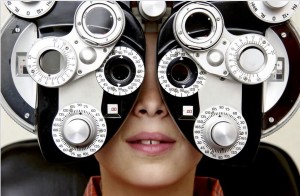Many of the things we do every day are designed to help us protect our health and avoid disease, from eating nutritiously and exercising regularly to brushing our teeth and getting enough sleep. So here’s the secret to protecting your vision and preventing the damage that glaucoma can cause:
Get regular eye exams
 It really is as simple as that. Regular eye exams are the best way to prevent significant glaucoma damage. That’s because early detection is key to maintaining vision, followed by proper, lifetime treatment. Call for an appointment today: 561.338.7722.
It really is as simple as that. Regular eye exams are the best way to prevent significant glaucoma damage. That’s because early detection is key to maintaining vision, followed by proper, lifetime treatment. Call for an appointment today: 561.338.7722.
Use this guide to protect your vision from the effects of glaucoma
If you have a high risk of developing glaucoma, such as from a family history of the disease or if you have diabetes, you should have your eyes tested every year or two after age 35. For everyone else, follow this schedule:
• If you’re under age 40, have your eyes checked for glaucoma every two to four years.
• Between the ages of 40 and 54, have your eyes checked every one to three years
• From 55 to 64, every one to two years
• After age 65, you should have your eyes checked for glaucoma every six to 12 months
Timely diagnosis and treatment make all the difference
Glaucoma-related vision loss happens slowly and without any signs until the damage has been done. It typically first affects side vision peripheral vision, but as it progresses, central vision is also lost.
There’s no way to prevent glaucoma, but your eye doctor can help you prevent the vision loss it can cause by:
• Diagnosing the disease in its earliest and most common form, primary open angle glaucoma
• Prescribing medications that can slow the progression of glaucoma by reducing the pressure that damages the optic nerve.
• Using surgical treatments if necessary
Prevent vision loss by protecting your eyes from injury
Eye injuries can cause traumatic glaucoma or secondary glaucoma, so use protective eyewear when playing sports or doing home and yard projects.
Exercise!
Studies have shown that moderate exercise such as walking three or more times a week can have an eye pressure lowering effect.


